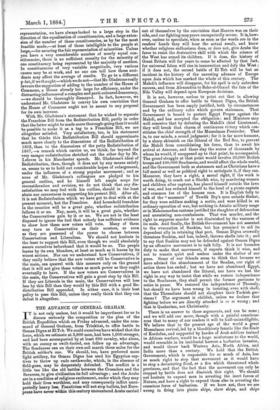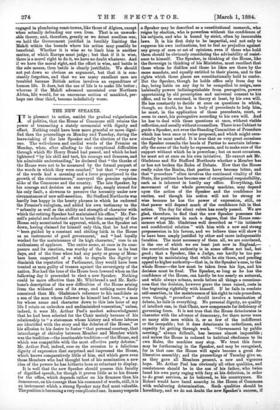THE ADVANCE OF GENERAL GRAHAM.
TT is not only useless, but it would be impertinent for us to discuss seriously the composition or the plan of the British Expedition which on Friday advanced, under the com-
mand of General Graham, from Trinkitat, to offer battle to Osman Digna at El Teb. We could ourselves have wished that the force, which we estimate at 3,800 men, had been 1,000 stronger, and had been accompanied by at least 600 cavalry, who alone, with an enemy so swift-footed, can follow up an advantage. The Soudanese can on their own soil march three miles for the British soldier's one. We should, too, have preferred more light artillery, for Osman Digna has used his Egyptian cap- tives to throw up rude earthworks, which, in the absence of field-guns, may be desperately defended. The conflict is a little too like the old battles between the Crusaders and the
Saracens, to give civilisation its full advantage ; and the Arabs are in a condition of religious excitement, under which they may hold their lives worthless, and may consequently inflict unex- pectedly heavy loss. Fanaticism will not stop bullets, but Euro- peans have never within this century encountered Arabs carried out of themselves by the conviction that Heaven was on their side, and our fighting may prove unexpectedly severe. It is, how- ever, useless to speculate, when as soon as the words are in the readers' hands they will hear the actual result, and know whether religious enthusiasm does, or does not, give Arabs the force to resist the destructive skill with which the science of the West has armed its children. If it does, the history of Great Britain will for years to come be affected by that fact, for universal Islam will rise in insurrection and defy the West ; if it does not, the second battle of El Teb will be but an incident in the history of the unseating advance of Europe upon Asia which has marked the whole of this century. The Mandi's influence will disappear, for his spell is only unbroken success, and from Alexandria to Bahr-el-Ghazel the fate of the Nile Valley will depend upon European decisions.
It is not, however, useless to point out that in allowing General Graham to offer battle to Osman Digna, the British Government has been amply justified, both by circumstances and by the ordinary rules which govern statesmen. That Government is bound to protect Egypt Proper against the Mandi, and has accepted the obligation : and Ministers may well conceive that by defeating the Mandi's chief Lieutenant, they will break that charm of continuous victory which con- stitutes the chief strength of the Mussulman Pretender. That is, to our minds, a sound judgment ; for it is far more humane, by a sharp skirmish on the littoral of the Red Sea, to prevent the Mandi from consolidating his force, than to await his arrival at Assouan, and there slay the scores of thousands by whom he would, if unopposed up to that point, be accompanied. The grand struggle at that point would involve 30,000 British troops and 100,000 Soudanese, and would affect the whole world, and the Government both as statesmen and as Christians have a full moral as well as political right to anticipate it, if they can. Moreover, they have a right, a moral right, if the work is worth doing, to crush out a Sheikh who, by murdering women and children after capture, has placed himself outside the laws of war, and has reduced himself to the level of a pirate captain and common foe cf the human race. It is English folly to talk of the " massacre" of Tewfik Bey's men outside Sinkat, for they were soldiers making a sortie, and were killed in an ordinary operation of war, but nothing in Asiatic military usage or in Mahommedan customs justified the slaughter of defenceless and unresisting non-combatants. That was murder, and the right to suppress murder is not diminished by the vastness of its scale. And finally, the British Government has not assented to the evacuation of Suakim, but has promised to aid its dependent ally in retaining that port. Osman Digna avowedly threatens Suakim, and has, indeed, thrown shells into it ; and to say that Suakim may not be defended against Osman Digna by an offensive movement is to talk folly. It is our bounden duty to make that movement, if experts think it wise, and not to remain quiet and useless under the shelter of our guns. Some of our friends seem to think that because we have advised the abandonment of the Soudan, our right of action there has ended ; but we have not abandoned Egypt, we have not abandoned the littoral, nor have we lost the right in any way to insist that while we restore independence to the Soudanese, they shall permit the former garrisons to retire in peace. We restored the independence of Thessaly, but should we have been wrong in insisting, even with shell, that the Thessalians should not slaughter their Turkish gar- risons ? The argument is childish, unless we declare that fighting before we are directly attacked is in as wrong ; and that is Quakerism, not Christianity.
There is no answer to these arguments, and can be none ; and we will add one more, though with a painful conscious- ness that to many of our readers it will be half-unintelligible. We believe that in the present age of the world a great Mussulman revival, led by a bloodthirsty fanatic like the Emir of Kordofan, and supported by hordes of Arab soldiers trained in African warfare, would be a huge misfortune to the world, would resemble in its incidental horrors a barbarian invasion, and would throw back Western Asia, North Africa, and India more than a century. We hold that the British Government, which is responsible for so much of Asia, has as much right to stop that movement as it would have to stop a devastating flood, or a fire which threatened whole provinces, and that the fact that the movement can only be stopped by battle does not diminish this right. We should not hesitate to expend men in arresting the inert forces of Nature, and have a right to expend them also in arresting the conscious force of barbarism. If we have not, then we are wrong in firing into pirate ships, slave ships, and ships engaged in plundering coast-towns, like those of Algiers, except when actually defending our own lives. That is an unwork- able theory, and, therefore, greatly as we detest needless war, we hold the Government justified in forcibly limiting the Mandi within the bounds where his action may possibly be beneficial. Whether it is wise so to limit him is another matter, of which Europe must judge ; but that if it is wise, there is a moral right to do it, we have no doubt whatever. And if we have the moral right, and the effort is wise, and battle is the sole means, then battle is clearly justifiable. We should not put down so obvious an argument, but that it is con- stantly forgotten, and that we see many excellent men are troubled because British action involves an expenditure of human life. It does, but the use of life is to make life better ; whereas if the Mandi advanced unresisted over Northern Africa, life would, for an enormous section of mankind, per- haps one clear third, become indefinitely worse.



































 Previous page
Previous page